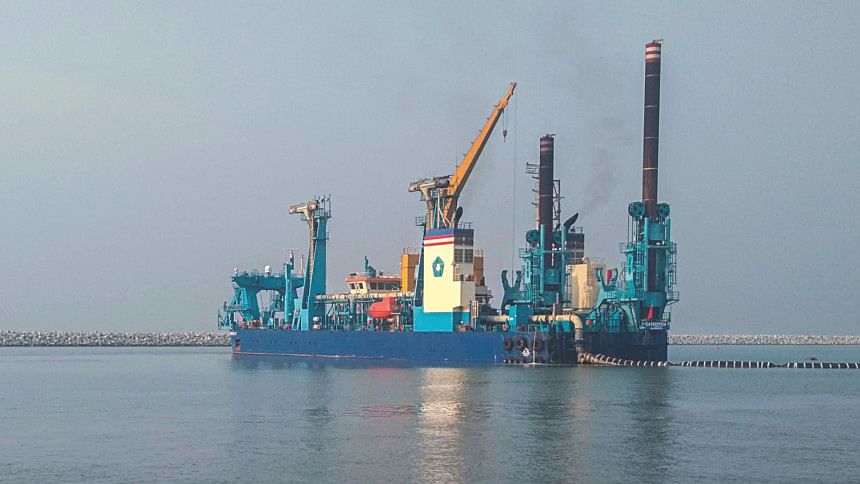Matarbari Deep Sea Port: It’ll boost GDP, create 9 lakh jobs

The Matarbari deep seaport, which is set to start operation in 2026, will help Bangladesh accelerate its GDP growth by an additional 1.14 percentage points and create nine lakh jobs, says a study.
Bangladesh's first deep sea port in Cox's Bazar and the other related regional connectivity projects can also help the country tackle the challenges of its LDC graduation, it said.
The study was jointly conducted by the South Asian Network on Economic Modeling (SANEM) and Shillong-based Indian think tank Asian Confluence
Selim Raihan, executive director of SANEM and also an economics professor at Dhaka University, presented the study on the impact of Matarbari port at a policy conference at the capital's North South University (NSU) yesterday.
The Center for Peace Studies (CPS) of the South Asian Institute of Policy and Governance (SIPG) at the NSU organised the event titled "From the Himalayas to the Bay of Bengal: New Possibilities in the Bangladesh, Japan, India Trilateral Partnership".
During Prime Minister Sheikh Hasina's recent visit to Japan, the countries discussed the creation of industrial value chain and connectivity to the Northeastern India and southeastern Bangladesh centering the Matarbari port. Japan is implementing the port project.
Prof Selim said the Matarbari port will facilitate berthing of ships with a draft of more than 16 metres, compared to those of 9.5 metres in Chattogram Port. This would significantly reduce the travel time and distance for carrying goods, making trade more viable, he added.
He said there are still significant challenges to developing infrastructures for connecting the Northeastern India with Bangladesh and building inland and overland transportation networks.
With the India-Japan Comprehensive Economic Partnership Agreement (CEPA) in operation and Bangladesh planning CEPA with India and Japan, a trilateral free trade zone would eventually emerge in the near future, Selim told the programme.
"The Matarbari deep sea port will significantly reduce the travel time and distance for carrying goods, making trade more viable."
The SANEM executive director suggested India and Bangladesh scale up the multi-modal connectivity, bring synergy in trade facilitation and build express corridors for transshipment and transit of goods from the Northeast of India to Chattogram and Matarbari and vice versa.
Speaking at the event, Foreign Secretary Masud Bin Momen said Matarbari deep sea port along with the other ports in Payra, Mongla and Chattogram, and other connectivity to India, Nepal, Bhutan and Asean can help Bangladesh achieve 10 percent GDP growth, which is required for the country to become a developed nation by 2041.
Japanese companies are already in the process of investing in the Japan-built special economic zone in Araihazar of Narayanganj, Masud said.
The foreign secretary said Indian companies are expected to invest in Bangladesh, with more opportunities being created.
Japanese Ambassador to Bangladesh Iwama Kiminori said his country will continue carrying out development activities in Bangladesh like it has been doing for 50 years, regardless of who is in power in Bangladesh.
Asked about Bangladesh's elections, he said he won't comment on the matter.
Prof Shahidul Haque of SIPG said both Japan and India are very close and strategic partners of Bangladesh, and global shift in geopolitics has catalysed the three countries for the trilateral initiative.
"We also need to improve people-to-people cooperation," he said.
NSU Associate Prof Jashim Uddin said the trilateral cooperation involving the Matarbari port may be a matter of concern for China, but Bangladesh can surely do whatever needs to be done in its national interest.
Unless Bangladesh joins any military alliance, there should not be any major issue from China's perspective, he added.
Asian Confluence Executive Director Sabyasachi Dutta and NSU Vice Chancellor Prof Atiqul Islam also spoke at the event, moderated by NSU Prof Sk Tawfique M Haque.

 For all latest news, follow The Daily Star's Google News channel.
For all latest news, follow The Daily Star's Google News channel. 



Comments